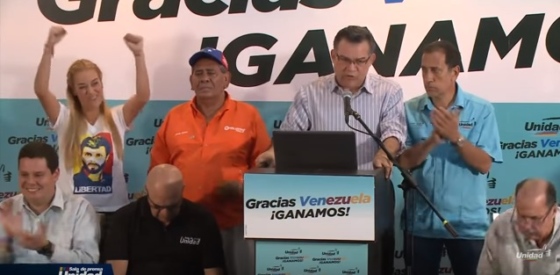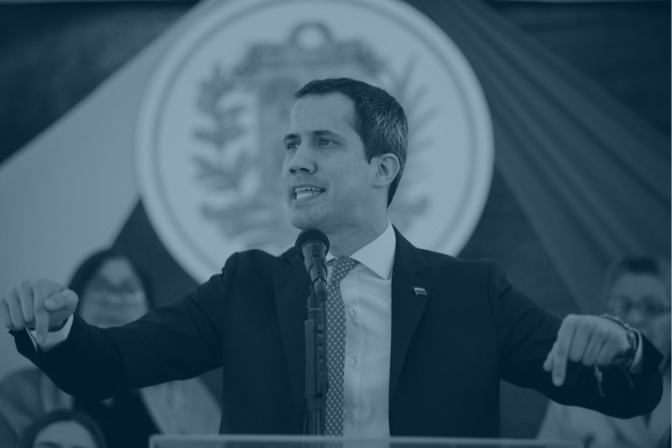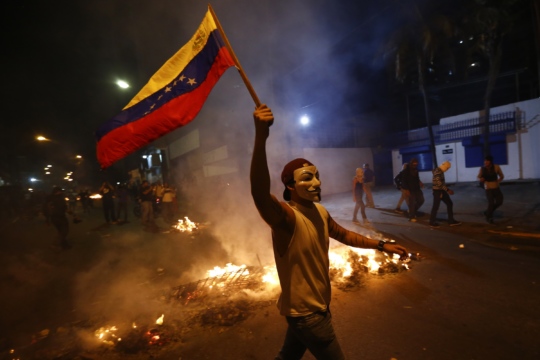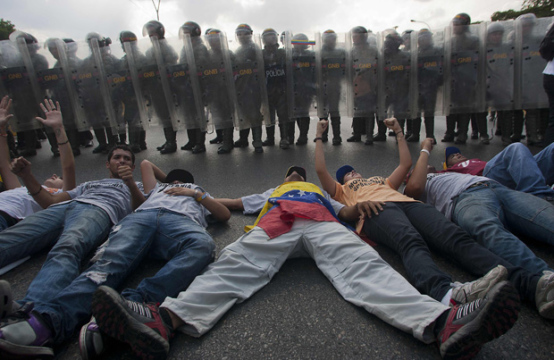
What Does the Future Hold for Venezuela?
What do the election results mean for President Nicolás Maduro and his grip on the presidency?
This post is also available in: Español
On May 20, 2020, the Inter-American Dialogue hosted a wide-ranging conversation with Juan Guaidó, president of the Venezuelan National Assembly. Guaidó is recognized by over 50 countries as Interim President of the Bolivarian Republic of Venezuela. This conversation was moderated by Laura Chinchilla, former president of Costa Rica and co-chair of the Dialogue’s Board of Directors. Chinchilla additionally leads the Dialogue’s Venezuelan Working Group alongside former US ambassador Donna Hrinak. Michael Shifter, president of the Dialogue, delivered the opening remarks.
Shifter began the conversation by addressing the unprecedented nature of Venezuela’s humanitarian crisis in the hemisphere as well as its aggravation due to the outbreak of Covid-19. He asserted that “the resolution of this crisis has been and continues to be the most urgent priority of the Dialogue.” To this end, Guaidó stressed the necessity of forcing a negotiation with the Maduro regime since it has not voluntarily demonstrated any form of generosity towards the Venezuelan people. The regime has not permitted any humanitarian assistance to enter the country, nor has it allowed for the registry of NGOs, ultimately preventing the United Nations from channeling aid through local implementors.
As a result, 92 percent of homes currently lack running water, 84 percent of homes suffer from daily or weekly power outages, and 32 percent of the population must resort to cooking with firewood. The public health system is equipped with a meager 84 ventilators, and the private health system is not much better off with 300. Guaidó emphasized that the humanitarian crisis that Venezuela is living is not the result of a natural disaster or a traditional war but rather a consequence of the regime’s disregard for its own citizens and the rule of law. While Guaidó has put forward a proposal for a national emergency government specifically targeted at the public health system and aid delivery, it has gone unsupported by the regime.
In addition to the heightened humanitarian crisis, Guaidó discussed other recent developments including the failed Operation Gideon and the imminent arrival of five Iranian oil tankers on Venezuelan shores. In regard to Operation Gideon, Guaidó denied any participation in the unsuccessful incursion. He claimed that “it has only benefited the Maduro regime as they have been able to utilize the operation as fodder for propaganda on the international stage as well as an opportunity to send a message of continued persecution to the democratic opposition.” Furthermore, in response to Chinchilla’s question as to whether this incident has led him to reconsider the use of force as a possible mechanism to resolve Venezuela’s political situation, Guaidó affirmed his belief that the best mechanism towards a democratic transition is international, diplomatic, and civic pressure.
With respect to the pending provision of 1.5 million barrels of Iranian oil to Venezuela, Guaidó declared that this exchange ought to alarm Latin America. He indicated that the regime carried out this deal without the approval of the National Assembly, and it is his assumption that they will pay for the fuel with illegally extracted gold from the southern jungles of Venezuela. Guaidó refers to this medium of exchange as “blood gold” since miners committed both ecocide and ethnocide by decimating the natural landscape and eliminating the indigenous populations in order to extract it. Moreover, he disclosed that Venezuela’s refining network has the capacity to produce 1.3 million barrels of oil a day, underscoring the regime’s mismanagement of the country’s own oil industry and its ironic need to import fuel.
Looking ahead to the Venezuelan parliamentary election of December 2020, Guaidó expressed, “Participation in a free and fair election is the central element to this conflict’s resolution.” While his primary objective in the coming months is to recover Venezuelan citizens’ legitimate right to vote, Guaidó and the democratic opposition are ultimately striving towards a cessation of Maduro’s usurpation of power, a transitional government, and a restored democracy achieved by means of elections.
To conclude the session, Guaidó answered questions sent in by audience members, addressing topics such as the Inter-American Treaty of Reciprocal Assistance, the role of the Lima Group, and the World Food Program’s intervention in Venezuela. Finally, during her closing remarks, Chinchilla affirmed, “We believe that Venezuela can conclude 2020 by organizing an election with the necessary conditions that will guarantee a transition to democracy.”
Venezuela’s Military to Escort Iranian Fuel Tankers: Defense Minister (May 20, 2020 – New York Times)
Guaidó asegura que presencia de Irán en Venezuela es motivo de alarma para la región (May 20, 2020 – América Digital)
What do the election results mean for President Nicolás Maduro and his grip on the presidency?
An economic and humanitarian crisis, precipitated by the Maduro regime, has brought Venezuela to the brink of collapse.
En una entrevista con BBC Mundo poco después de que Trump dijera este viernes que su gobierno maneja varias opciones respecto a la crisis en Venezuela, “incluida la opción militar si es necesaria”, Shifter sostuvo que esto podría servir como “un regalo” para Maduro.
 @jguaido via Twitter
@jguaido via Twitter

